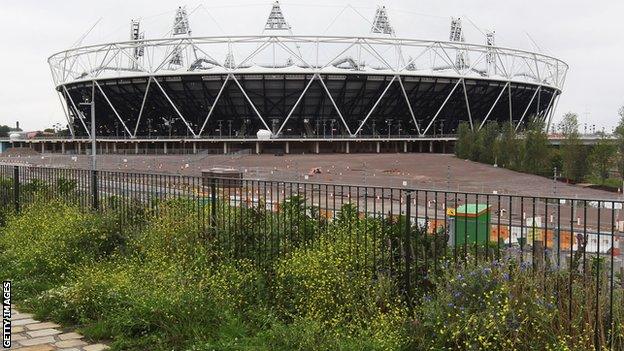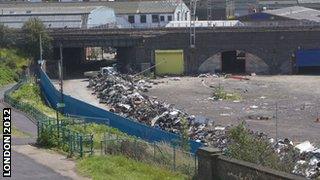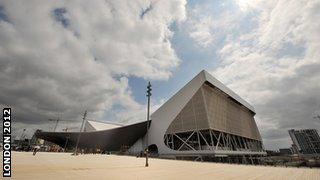London 2012: The long journey from bid to Games
- Published

Contaminated, neglected land in Stratford was transformed to make way for the Olympic Park
As Tessa Jowell, the former Olympics minister, has articulated many times in the past, winning the right to stage the 2012 Games was actually the easy bit. Far greater was the responsibility of having to deliver them.
Paris had implied that the rival London bid was a "paper" one, with too much building work to do for the comfort of the International Olympic Committee.
It was also implied that the city faced an almost impossible challenge to get everything done in time.
London's proposition was to create a vast public park with a string of new permanent and temporary competition venues built from scratch.
The land the team had chosen was a largely run-down industrial area.

The Olympic Park was wasteland in April 2009 before it was transformed
Abandoned, graffiti-daubed buildings slumbered next to sludgy, slow-moving streams, thick with years of contamination and neglect.
This imagined re-birth of the lower Lee Valley around Stratford was to happen in a capital city whose transport links were already strained to capacity.
The record on major building projects, like the Millennium Dome and Wembley Stadium, had been derided, and home-grown terrorists had rocked confidence in security.
The plan
What Locog, the organising committee, had going for it was a detailed plan that had gone through a painful birth and had been subjected to immense scrutiny by an initially sceptical Government.
Crucially, the bid team travelled to Singapore with cross-party political support and the backing of the London Mayor.
Without that breadth of support, the project might have foundered early on when the real cost of staging both the Olympics and Paralympics - £9.3bn, including a huge contingency fund of £2.7bn - became evident.
Some have always seen the Games as an errant waste of money, so the re-drafting of the budget hardened that view, straining the united political front to breaking point.
It was against that backdrop that the Olympic Delivery Authority (ODA) began the work of flattening the site, decontaminating the soil, removing the pylons, creating vast underground tunnels for power cables and re-shaping and re-imagining the area.
This was all before the architects, engineers and construction companies could even begin to create the venues.
There was a main stadium to build, an aquatics centre, a bespoke velodrome, a multi-sport arena and broadcast and media centres.
As well as bridges, roads and waterways.
"Not a day to waste," was the mantra. "Not possible, thanks very much," seemed to be the view of the first ODA chairman, Jack Lemley, who quit just a few weeks after taking the job.

Initial designs for the Aquatics Centre were revised to save costs
Jowell had promised Parliament that not a penny more would be spent on the project, so a process of paring back began.
The ambitious initial designs for the Aquatics Centre were revised to save costs and a specialist project management company was appointed at eye-watering expense to get value for money out of every contract.
While the government and ODA juggled conflicting priorities, Locog was pulling what now looks like a masterstroke.
It took the "not a day to waste" approach by securing major sponsors in a bid to secure a budget of £2.2bn from private sources.
Much of the world was about to tip into a banking crisis and a recession, yet Locog had succeeded in stitching up deals that could surely never be landed now.
So, with four months to go until the start of the Olympics and the IOC making its 10th and final inspection visit to London, it now seems like a good time to take stock.
Olympic Park
Building work is complete, on time and within budget - most of the venues have been tested and meet requirements, and final landscaping works are under way.
There is a downside to the ODA's efficient handling of construction. It means more column inches have been spent on the issue of tickets and security.
Upsetting the public because not enough of them have got the chance to see the live action is an interesting problem for an organising committee to manage.
The demand for tickets was phenomenal and unprecedented. It is impossible to satisfy everyone, but opinions differ over whether the system used to allocate and sell tickets was actually the "least worst", as Locog insist it was.
As for security, recruiting double the number of venue personnel than was originally budgeted for, was certainly not Locog's finest hour.
Locog has also faced strident opposition from some local residents in Greenwich over the use of Greenwich Park for equestrian events
And there is a continuing agitated dialogue over how the Olympic Games Lanes will operate.
In truth, the greatest challenge still facing Locog is transportation because no amount of modelling, planning and predictions will really tell it what is going to happen when hundreds of thousands of people head to the park from all over London on peak days.
Flow charts, presentations and reassuring words will count for nothing if the Jubilee and Central Underground lines fail and the public are unable to hand their highly prized tickets in at the door.
Then there is the question of what happens to the Olympic venues once the Paralympics end on 9 September.
The Olympic Park Legacy Company is the body responsible for working out what should happen with all the buildings and facilities in the park.
Its brief is to find cost effective ways which have a lasting benefit to the community and for sport.
The company's biggest headache is the Olympic Stadium. Four bids are under consideration, with West Ham United being the most high profile.
The football club will have to be prepared to share the stadium - possibly with a concert promoter. It will remain in public hands and have to keep the athletics track.
Still, IOC president Jacques Rogge told Prime Minister David Cameron earlier this week that he was "happy" with the way London had gone about its work, but he admitted that "the proof of the pudding will be in the eating".
- Attribution
- Published30 March 2012